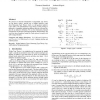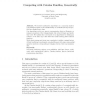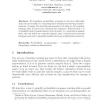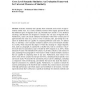108
click to vote
POPL
2016
ACM
9 years 10 months ago
2016
ACM
According to conventional wisdom, a self-interpreter for a strongly normalizing λ-calculus is impossible. We call this the normalization barrier. The normalization barrier stems ...
100
click to vote
POPL
2016
ACM
9 years 10 months ago
2016
ACM
We present an internal formalisation of dependent type theory in type theory using a special case of higher inductive types from Homotopy Type Theory which we call quotient induct...
107
click to vote
POPL
2016
ACM
9 years 10 months ago
2016
ACM
Our new macro expander for Racket builds on a novel approach to hygiene. Instead of basing macro expansion on variable renamings that are mediated by expansion history, our new ex...
124
click to vote
PADL
2016
Springer
9 years 10 months ago
2016
Springer
The combination of monads and effects leads to a clean and easy to reason about programming paradigm. Monadic programming is easy to reason about, but can be cumbersome, as it requ...
128
click to vote
PADL
2016
Springer
9 years 10 months ago
2016
Springer
We describe arithmetic algorithms on a canonical number representation based on the Catalan family of combinatorial objects specified as a Haskell type class. Our algorithms work ...
131
click to vote
PADL
2016
Springer
9 years 10 months ago
2016
Springer
We transform probabilistic programs to run more efficiently and read more easily, by composing three semantics-preserving transformations: (1) apply the denotational semantics; (2)...
197
click to vote
PADL
2016
Springer
9 years 10 months ago
2016
Springer
SAT has become the backbone of many software systems. In order to make full use of the power of SAT solvers, a SAT compiler must encode domain variables and constraints into an e�...
161
click to vote
LRE
2016
9 years 10 months ago
2016
Abstract This paper is an extended description of SemEval-2014 Task 1, the task on the evaluation of Compositional Distributional Semantics Models on full sentences. Systems partic...




